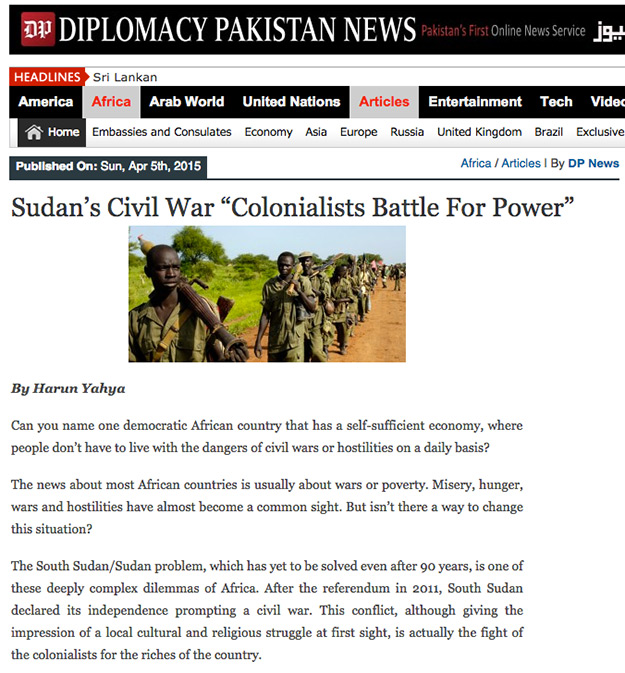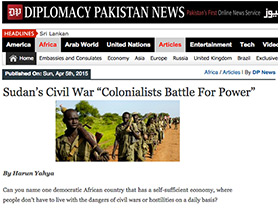
Can you name one democratic African country that has a self-sufficient economy, where people don’t have to live with the dangers of civil wars or hostilities on a daily basis?
The news about most African countries is usually about wars or poverty. Misery, hunger, wars and hostilities have almost become a common sight. But isn’t there a way to change this situation?
The South Sudan/Sudan problem, which has yet to be solved even after 90 years, is one of these deeply complex dilemmas of Africa. After the referendum in 2011, South Sudan declared its independence prompting a civil war. This conflict, although giving the impression of a local cultural and religious struggle at first sight, is actually the fight of the colonialists for the riches of the country.
The real problem is the contest for control of the Muglad Basin and the Abyei region between Sudan and South Sudan, which is rich in oil reserves. The most important revenue source of South Sudan is oil and considering that 97% of their income comes from oil, it becomes abundantly clear why oil is so crucial for South Sudan. It is estimated that there are 3.5 billion barrels worth of oil reserves worth and 3 trillion cubic feet worth of natural gas reserves. However, in order for South Sudan to be able to sell the oil it extracts, it needs to use the pipeline going through Sudan. This interlinked structure fuels conflicts, and add to the fact that Sudan’s neighbors want a share from the transportation and exportation to international markets of the extracted oil, the pressure both on Sudan and and South Sudan increases even further.
China is the biggest buyer of the oil produced by Sudan and almost all the oil in the country is extracted by the Chinese and Malaysian companies. That’s why China wants to be involved in everything and ensure that the USA doesn’t get any control in the region. The situation gets even more complicated, with accusations of colonialism by the USA and China against each other, and worsened by France trying to get a share.
It is a known fact that China has immense energy and food needs and the oil and agricultural products of Africa seem the right solution to meet that need. For this reason, China needs Africa greatly and will do anything to make sure that it gets what it needs.
Another point that makes the situation even more complicated is the familiar trend in Africa where the people running countries are pawns of the colonial powers. They can do almost everything for money, putting the their personal interests before those of the nation. They spend billions of dollars on weapons, using the money they receive from the colonial powers and squandering the riches of their countries not on their people, but on wars.
Many African leaders do not leave their seats until replaced by someone who finally manages to overthrow them. In these countries, many of which there is not even a semblance of democracy, the administrations make a habit of oppressing people and catering to only a limited part of the society. In truth, the domestic conflicts stemming from artificial reasons are usually created by ex-military dictators who wish to hold onto their power, or by the colonial powers supporting them.
The price of this civil war between Sudan and South Sudan is being paid by the innocent people, at the cost of their lives and poverty. It is a known fact that thousands of people have died in the civil war, but there are no definite numbers. It is also reported that 1.5 million people are displaced within the country and some 2.5 million people face hunger.
The ineffective policies of UN cannot solve any of the problems currently ongoing in the world and therefore it is not entirely surprising that it cannot prevent the hostilities between Sudan and South Sudan. Today, there are 8,500 UN Peace Force troops in South Sudan, but the conflict still continues.
The only serious player that makes a concrete effort to ensure peace is the African Union. Even the fact that the peace talks started in Addis Ababa, Ethiopia where the African Union is based, is considered an important development. However no one has any hope for permanent peace anytime soon.
The developments in Sudan, which is but a small glimpse of what is going on in Africa, can help understand Africa in general. The statistics paint a clear picture; one which is not all that bright.
Today there are 925 million hungry people in the world; in other words 13.6% of the 6.8 billion people of the world are going hungry. There are 239 million hungry people in Sub-Saharan Africa and 37 million hungry people in North Africa, equal to 35% of the hunger in the world: The daily income of the Sub-Saharan countries averages about 1.25 dollars/per person. Hunger strikes the children the hardest. Every year, five million children die of hunger and malnutrition; 26% of these deaths take place in African countries. The international community needs to be more responsive to the situation, both in Sudan and in other African countries struggling with internal conflicts and widespread starvation. In international relations, it is far important to offer conciliatory solutions instead of policies of narrow interest.
Adnan Oktar's piece on Diplomacy Pakistan News:
http://www.diplomacypakistan.com/africa/sudans-civil-war-colonialists-battle-for-power/


